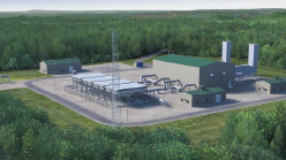More than 500 new gas-fired generation projects are in various stages of consideration or development around the country. The capacity of these proposed projects totals some 280,000 megawatts, an increase of more than 35 percent of the currently installed U.S. capacity base of 750,000 MW. Yet many of these projects contain no plans for backup fuel capacity to replace the baseload fuel of natural gas. This trend continues, even as gas price forecasts are significantly higher than historical prices.
This report, prepared by S&W Consultants and Stone & Webster Engineering Corp., found that as states unbundle electric utility service and open generation to competition, developers of new generation projects look at all aspects of project development time and cost to develop an economic edge. An unregulated seller of generation output has a different point of view regarding reliability versus that of the old, integrated, regulated utility. The unregulated developer/operator is concerned with honoring his contractual sales commitments and his financing obligations, not with an obligation to provide reliable service to end users. Any item that increases permitting time, especially the inclusion of backup fuels, delays the in-service date of a new project.
This report finds that the massive amount of new gas-fired generation will put a severe strain on gas supplies and gas pipeline delivery capacities in the next three to five years. Volatility in delivered gas prices during this period could remain high during cold weather or operational incidents. A much larger slice of U.S. electric generation will become gas-fueled in the next few years, and thus subjected to these system stresses.
Deregulating the generation market and placing almost all new capacity, and much of the old capacity, in the hands of unregulated profit maximizers with short-term perspectives places overall electric system reliability in a completely new atmosphere. Lack of backup fuel can exacerbate the reliability issue during "peak" conditions. Trusting market forces to successfully address these significant structural changes is a risk of sizable magnitude.





